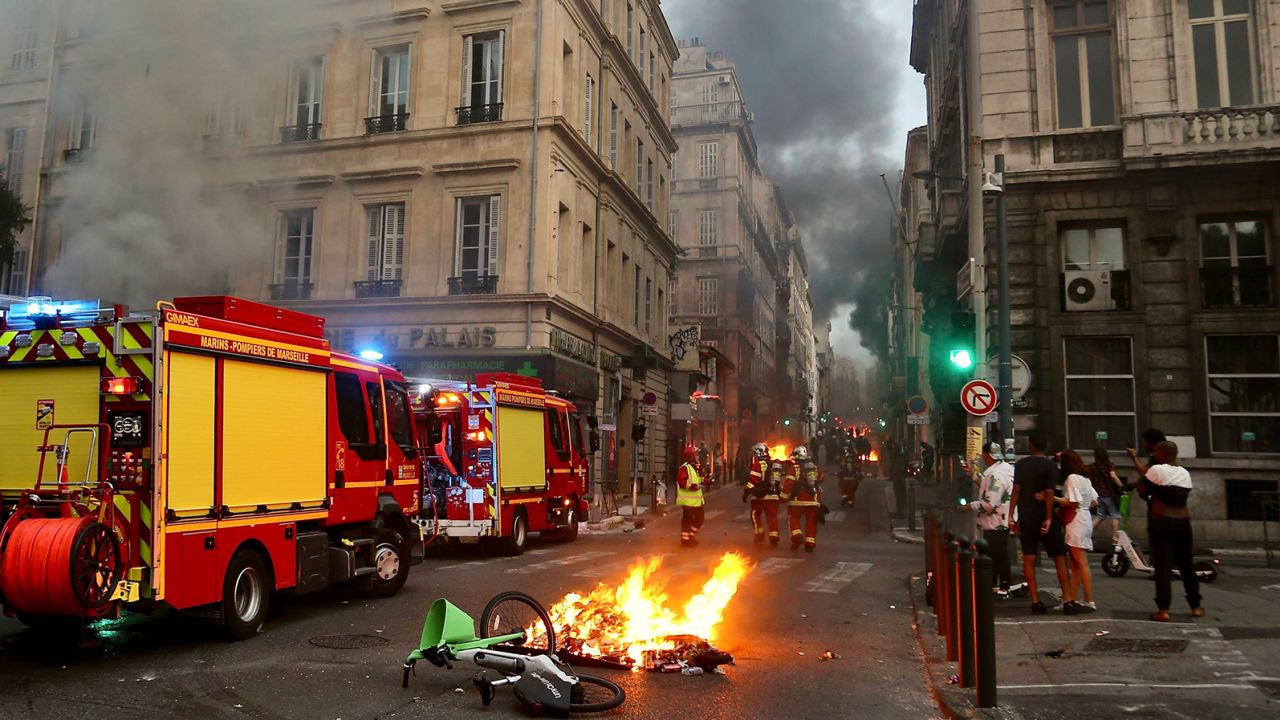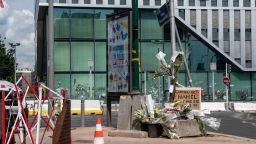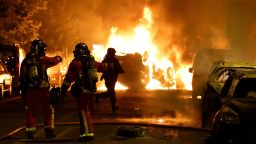Fires rage as police detain nearly 1,000 on fourth night of French protests
Fires raged across protest sites in France and nearly 1,000 people were detained as violent demonstrations over the killing of a 17-year-old shot by police entered a fourth night.
Protests continued into the early morning of Saturday in defiance of a ban announced a day earlier on all “large-scale events” in the country, with rioting breaking out in several cities, CNN affiliate BFMTV reported.
France’s Interior Ministry said Saturday 994 people had been detained following the fourth night of violence. It said 2,560 fires had been reported on public roads, with 1,350 cars burned, and there had been 234 incidents of damage or fire in buildings.
Seventy-nine police and gendarmes were injured over Friday night and there had been 58 attacks on police and gendarme stations, it added.
Social media videos of scenes in Lyon, geolocated by CNN, showed rapid gunfire from an automatic rifle at night, fireworks being released at a protest and demonstrators next to burning fires.
There was an explosion in the Old Port of Marseille on Friday evening, according to BFMTV, but no casualties had been reported. It also shared video showing damage to the Alcazar library in Marseille which it said had been vandalized during the night.
The continued violence comes despite French police deploying 45,000 officers, special units, armored vehicles and helicopters across the country on Friday.
The country’s interior minister, Gerald Darmanin, had previously told BFMTV that that the violence had become a “lot less intense” and the situation in the Paris region calmer, though he said things remained tense in Marseille and Lyon.
Darmanin said in a tweet that reinforcements would be sent to Marseille following reports by the local mayor of violence and looting.
Marseille mayor Benoit Payan had tweeted late Friday night that the scenes were “unacceptable” and called upon the state to “immediately send additional law enforcement forces.”
The previous night, 917 people had been detained, among them children as young as 13, Darmanin told French TV channel TF1.
Why are people protesting?
The unrest in France is a response to the death of 17-year-old Nahel, who was shot dead during a traffic stop Tuesday morning in the Paris suburb of Nanterre.
A funeral for Nahel is scheduled to take place on Saturday at 11 a.m. local time (5 a.m. ET).
Footage of the incident filmed by a bystander showed two officers standing on the driver’s side of the car, one of whom fired his gun at the driver despite not appearing to be in any immediate danger.
The officer has said he fired his gun out of fear that the boy would run someone over with the car, according to Nanterre prosecutor Pascal Prache.
The officer currently faces a formal investigation for voluntary homicide and has been placed in preliminary detention.
Despite calls from top officials for patience to allow time for the justice system to run its course, a sizable number of people across France remain shocked and angry, especially young men and women of color who have been victims of discrimination by police. Nahel was of Algerian descent.

Protests appear even to have spread to overseas French territories.
A man was killed by a “stray bullet” during riots in Cayenne, the capital of French Guiana, on Thursday evening, according to a statement from the city’s mayor.
“The situation is worrisome with the violent riots that have been ongoing in mainland France for several days. Our territory must not be engulfed in this spiral of violence,” the statement read.
Authorities in Réunion, a French territory in the Indian Ocean, said Saturday that at least 28 people had been detained in riots there, while five police officers and a gendarme were injured.
Darmanin has said that the death of Nahel “cannot justify the disorder and the delinquency,” while French Justice Minister Éric Dupond-Moretti has called for “firm sanctions” against the rioters and said that “justice was not achieved by looting, smashing public establishments and attacking people.”
State of emergency ‘not necessary’: Elysée
This level of unrest and rioting has not been seen in France since 2005, when the deaths of two teenage boys who were hiding from police sparked weeks of rioting and prompted the government to call a state of emergency.
But the French government has so far resisted calling a state of emergency this time around.
A spokesperson for the Elysée said Friday that a state of emergency was “not necessary” and that a “gradual response” to the violence seen in recent days was “more appropriate.”
The spokesperson noted that the 2005 state of emergency was called “after about nine days of violence,” adding that the law surrounding it was an “exception” that should be used only “when the situation on the ground requires it.”
“This is not the revolt of neighborhoods. This is not about disenfranchised neighborhoods. This is the action of a delinquent minority,” the spokesperson said, denying there was any racial motivation behind the shooting and insisting it was an “individual act” that did not represent the police at large.





No comments:
Post a Comment